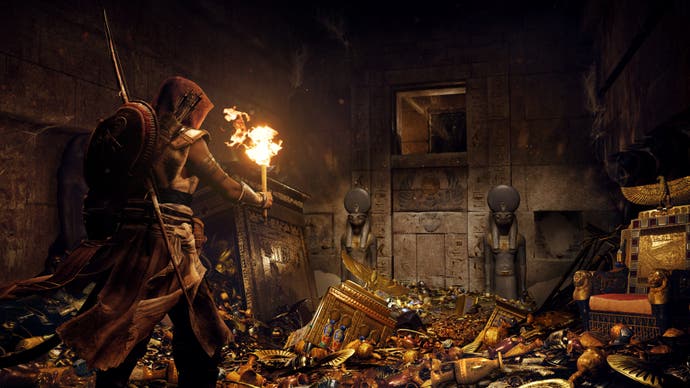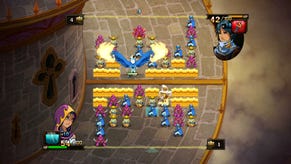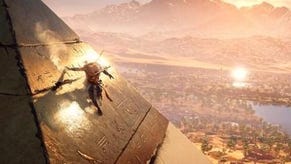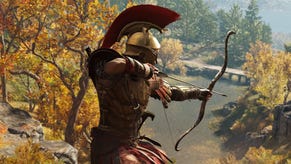Assassin's Creed Origins is the series you remember, back yet again
Never tomb much of a good thing?
Here's something to make you feel old: the original Assassin's Creed launched a whole decade ago. It's been 10 years since Assassin's Creed featured grumpy old Altair, imprisoned poor Desmond, and introduced now-ingrained concepts such as the Animus, Abstergo, and snazzy clothes with hoods.
Hoods aside, Assassin's Creed: Origins takes great pains to appear new - or it did in the sizable chunk of the game I played last week, at any rate. For this last preview prior to release, I was given four hours to roam Origins' open world and get a feeling for how this enormous thing will play when it arrives at the end of this month.
Ubisoft bigs up its fresh historical playground for every Assassin's Creed, but what a vast and varied landscape Origins' sun-soaked space is. Egypt is the star of the game, from its dusty farmsteads to gaudy temples, palm tree-lined tracks and, off in the distance, cities such as Alexandria shimmering on the horizon. On foot or on the back of a camel you can wander for hours through the landscape and watch its inhabitants or wildlife do their thing. More impressive still is the new ability to fast forward this simulation at any point, to roll the clouds across the horizon at the touch of a button and turn morning to evening, afternoon through to night.
But as impressive as Egypt is, I feel like the quality of Origins' open world should not come as too much of a surprise. I've poked around its sandbox before, back at E3 in June, and to see our findings borne out over a much larger canvas is reassuring, if not entirely startling. Going into the play session last week I was more curious about what missions would actually have me getting up to in this landscape, how Origins' revamped combat played out after a couple of hours, and where the story of main character Bayek would actually lead.
Let's start with Bayek, who feels like a traditional Assassin's Creed protagonist - he's kind-hearted but quick to anger, warm but still lacking the charm of Ezio. As a sort-of sheriff he finds himself caught up in local events and swept into the path of some notable historical figures. But, between major story moments, locals will also want you to solve some of their own problems. These side-quests replace some of the icons previously scattered across the game's map, with objectives instead marked in a quest log, and further steps or other missions then unlocked as you progress. In the build I played, Origins' main story missions were pegged across a fairly steep levelling curve - with the impetus on the player to undertake side-quests or other world activities for XP and loot, in order to get ready for the next major story beat.
Assassin's Creed has had levelling mechanics for a while and the series has long had equippable gear slots, but Origins ratchets up the emphasis on both with a suite of new RPG-lite systems. Bayek's inventory and gear screens have been given a Destiny-style makeover, weapons and armour now coloured in familiar levels of loot rarity. Better weapons and gear can be found, earned, bought or crafted, and old items broken down either for currency or components, which you'll need to keep track of. While you can launch missions designed for slightly higher levels, you should be prepared for a rock-hard experience as a result.
Which leads me to the game's many side-missions: tasks for local inhabitants needing assistance, jobs which see you learning a little about daily life as an Egyptian during the end of the Egyptian era (it sounds... not that fun), and all number of other reasons to go poking about Ubisoft's world and either follow, fight or locate a person, item or place. These side-missions were, honestly, something of a letdown - I can see the need to spend a lot of time undertaking these in the game, and yet the many I played were surprising in their familiarity. 10 years on, Assassin's Creed is still asking me to go and kill a certain number of things, carry a certain number more, or go track down a certain something for someone. One mission, simply "go kill these animals", will likely remain in my quest log for quite some time. The series' investigation moments also return, giving you an area full of clues to find and puzzle through.

More fun, however, are the times you are tasked with infiltrating restricting areas, camps or hideouts of soldiers where you need to either liberate a prisoner or pick off a target. After struggling to learn guard patterns or unlocking a nearby lion cage only to get mauled yourself, the one attempt where everything goes to plan and you sneak off into the sunset entirely undetected makes the last 10 minutes of trying and failing all seem worthwhile. And all of this is lifted by Origins' revamped combat, which replaces the button-mashing sword and dagger stabbing from previous games with a layered fight system that includes blocks, dodges and rolls.
Origins' main missions are better still - including a standout moment which broke up the game's pace which I am sadly not allowed to discuss. This plot point was - game director Ashraf Ismail later told me - one of several such disruptive moments throughout the game. Origins' main storyline sees Bayek interact with Aya, his wife, who gets the pair caught up in events across Egypt, and in particular with the infamous Cleopatra. There are no Templars to fight, but a "proto-Templar" organisation exists to fill that role, named The Order of the Ancients. It is this organisation's head honchos who Bayek will spend his time throughout the game hunting down, and which will lead him to witness some of the era's defining moments. Origins' timeline will take in the dying days of Egypt, where the civilisations' most famous structures of the Pyramids and Sphinx were already ancient, and when the identity of being an Egyptian was slowly being eroded by the arrival of Caesar and the influence of other foreign powers.
Origins' pitch as a prequel lets it shed the backstory from the dozen or so games which have come before (it is the tenth major Assassin's Creed game in as many years, but more like the 20th when counting spin-offs). Yet it cannot escape the expectations - and a good bit of the formula - which has defined the series to date. It wouldn't be an Assassin's Creed game without a story which pits history as a battle of free will versus order - that much is to be expected. But apparently it also can't be an Assassin's Creed without some of the busywork, the familiar fetch quests, which the series has also become known for. Assassin's Creed has rebirthed itself several times in the past - when it left behind Ezio for AC3, when it took to the seas in Black Flag, and when it decided to implement co-op in Unity. Origins is another twist to the formula - an enormous open world which I am sure I will sink countless hours into exploring. But it remains familiar - as each Assassin's game has done over the past ten years - a feeling which, as I finish up my time with Origins, I am both reassured and unsurprised by.










